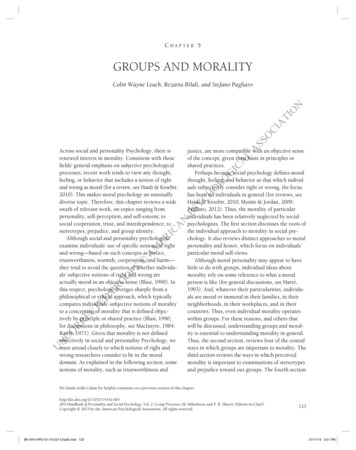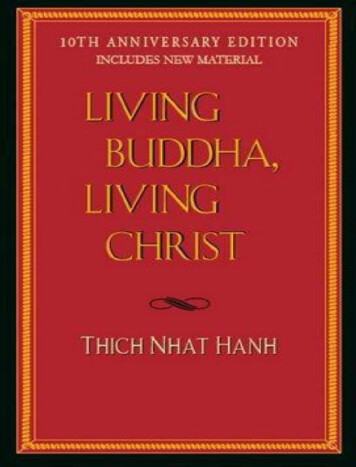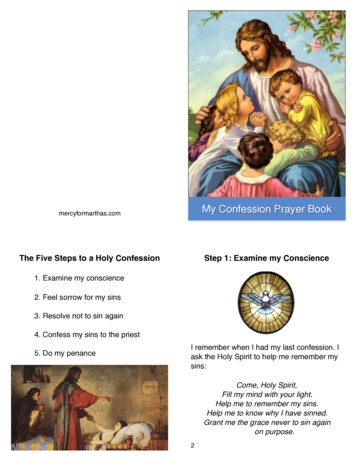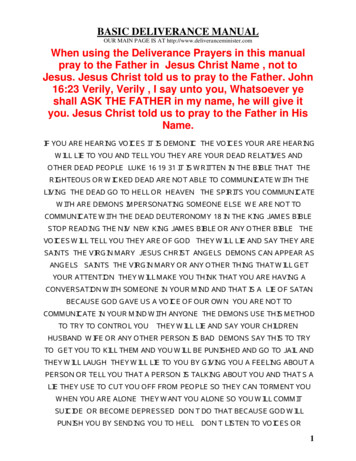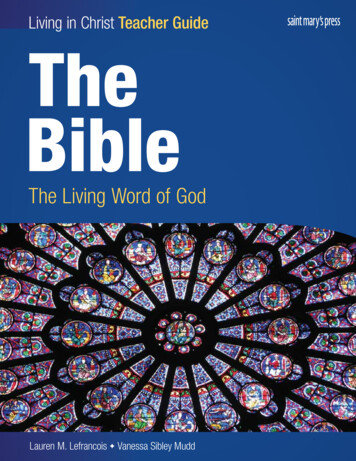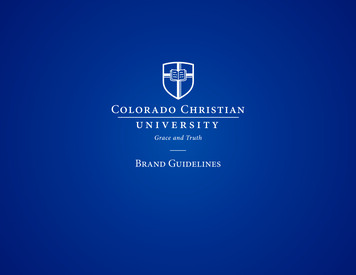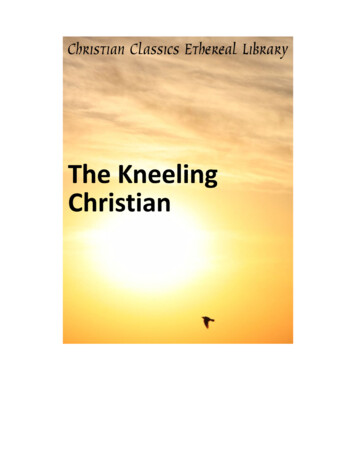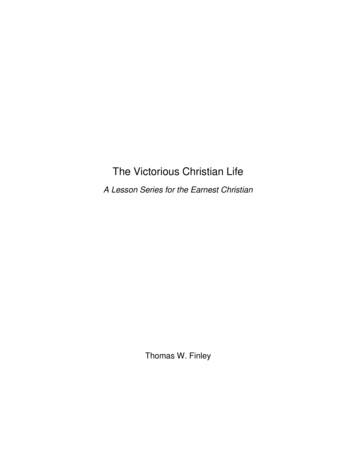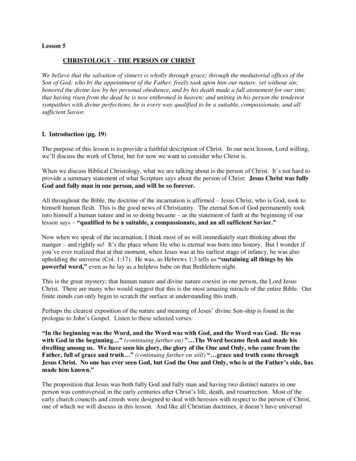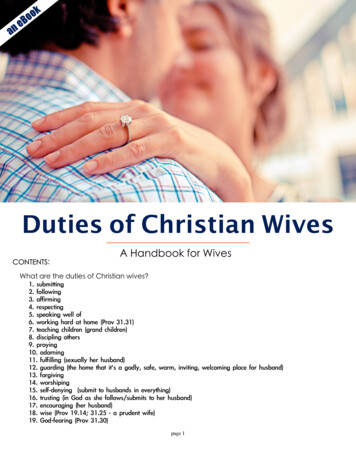
Transcription
Living in ChristChristianMoralityOur Response to God’s LoveBrian Singer-Towns
Living in ChristChristianMoralityOur Response to God’s LoveBrian Singer-Towns
The Subcommittee on the Catechism, United States Conference ofCatholic Bishops, has found that this catechetical high school text,copyright 2012, is in conformity with the Catechism of the Catholic Churchand that it fulfills the requirements of Course VI: “Life in Jesus Christ” ofthe Doctrinal Elements of a Curriculum Framework for the Development ofCatechetical Materials for Young People of High School Age.Nihil Obstat: Rev. William M. Becker, STDCensor LibrorumOctober 11, 2011Imprimatur:† Most Rev. John M. Quinn, DDBishop of WinonaOctober 11, 2011The nihil obstat and imprimatur are official declarations that a book or pamphlet is free of doctrinal or moral error. No implication is contained thereinthat those who have granted the nihil obstat or imprimatur agree with thecontents, opinions, or statements expressed, nor do they assume any legalresponsibility associated with publication.The publishing team included Gloria Shahin, editorial director; BrianSinger-Towns, development editor; Maura Thompson Hagarty, PhD,contributing editor and theological reviewer. Prepress and manufacturingcoordinated by the production departments of Saint Mary’s Press.Cover Image: The Crosiers / Gene Plaisted, OSCCopyright 2012 by Saint Mary’s Press, Christian Brothers Publications,702 Terrace Heights, Winona, MN 55987-1320, www.smp.org. All rightsreserved. No part of this book may be reproduced by any means without thewritten permission of the publisher.Printed in the United States of America1150 (PO4169)ISBN 978-1-59982-118-4, Saint Mary’s Press Online Learning Environment
ContentsIntroduction . . . . . . . . . . . . . . . . . . . . . . . . . . . . . . . . . . . . . . . . . . 7Section 1: Foundational Principlesfor Christian MoralityPart 1: Moral Choices and God’s Plan . . . . . . . . . . . . . . 9Article 1: Created for Love and Happiness . . . . . . . . . . . . . . 10Article 2: The Freedom to Choose . . . . . . . . . . . . . . . . . . . . . 13Article 3: New Life in Christ . . . . . . . . . . . . . . . . . . . . . . . . . . 18Article 4: Justification and Sanctification. . . . . . . . . . . . . . . . 22Part 2: The Law of God . . . . . . . . . . . . . . . . . . . . . . . . . 28Article 5: Eternal Law . . . . . . . . . . . . . . . . . . . . . . . . . . . . . . . 29Article 6: Natural Moral Law. . . . . . . . . . . . . . . . . . . . . . . . . . 32Article 7: Law and the Original Covenant . . . . . . . . . . . . . . . 36Article 8: Law and the New Covenant . . . . . . . . . . . . . . . . . . 40Article 9: Moral Law and the Church . . . . . . . . . . . . . . . . . . . 45Part 3: Sin and Its Consequences . . . . . . . . . . . . . . . . 51Article 10: Sin in the Old Testament. . . . . . . . . . . . . . . . . . . . 52Article 11: Sin in the New Testament . . . . . . . . . . . . . . . . . . . 57Article 12: Requirements for Sin . . . . . . . . . . . . . . . . . . . . . . 62Article 13: Types of Sin. . . . . . . . . . . . . . . . . . . . . . . . . . . . . . 66Article 14: Social Sin . . . . . . . . . . . . . . . . . . . . . . . . . . . . . . . 69
Section 2: Honoring GodPart 1: The First Commandment: Faith, NotIdolatry . . . . . . . . . . . . . . . . . . . . . . . . . . . . . . . . . . . . . . 76Article 15: Living the First Commandment . . . . . . . . . . . . . . 77Article 16: Idolatry, Ancient and Modern . . . . . . . . . . . . . . . . 82Article 17: Other Sins against the First Commandment . . . . 86Part 2: The Second Commandment:Reverence, Not Profanity . . . . . . . . . . . . . . . . . . . . . . . 90Article 18: Reverence, Responding to theSacredness of God. . . . . . . . . . . . . . . . . . . . . . . . 91Article 19: Keeping Sacred Commitments . . . . . . . . . . . . . . 94Article 20: Other Sins against theSecond Commandment . . . . . . . . . . . . . . . . . . . . 99Part 3: The Third Commandment: PreservingHoliness . . . . . . . . . . . . . . . . . . . . . . . . . . . . . . . . . . . . 102Article 21: Observing the Sabbath . . . . . . . . . . . . . . . . . . . . 103Article 22: The Sabbath and Sunday: A Short History . . . . 107Article 23: Keeping Sunday Holy . . . . . . . . . . . . . . . . . . . . . 110Section 3: Obedience,Honesty, and JusticePart 1: The Fourth Commandment:Respecting Authority . . . . . . . . . . . . . . . . . . . . . . . . . 117Article 24: The Importance of Families in God’s Plan . . . . . 118Article 25: Parent and Child Responsibilities. . . . . . . . . . . . 122Article 26: Respect for Public Life . . . . . . . . . . . . . . . . . . . . 127Article 27: Faithful Citizenship . . . . . . . . . . . . . . . . . . . . . . . 131
Part 2: The Eighth Commandment:Reality versus Illusion . . . . . . . . . . . . . . . . . . . . . . . . . 137Article 28: Honesty, the Key to Being Real . . . . . . . . . . . . . 138Article 29: Becoming a Person of Integrity . . . . . . . . . . . . . 143Article 30: Other Sins against Honesty . . . . . . . . . . . . . . . . 147Article 31: Calling Society to Integrity . . . . . . . . . . . . . . . . . 152Part 3: The Seventh and Tenth Commandments:Justice versus Injustice . . . . . . . . . . . . . . . . . . . . . . . 155Article 32: The Moral Law and Material Possessions . . . . . 156Article 33: Called to Be Just . . . . . . . . . . . . . . . . . . . . . . . . 162Article 34: Calling Society to Justice . . . . . . . . . . . . . . . . . . 167Article 35: Envy and Greed . . . . . . . . . . . . . . . . . . . . . . . . . 172Article 36: Live Simply So Others May Simply Live . . . . . . 176Section 4: Respecting Life and SexualityPart 1: The Fifth Commandment: Respecting Life . . 182Article 37: Life, God’s Greatest Gift . . . . . . . . . . . . . . . . . . . 183Article 38: Beginning-of-Life Issues . . . . . . . . . . . . . . . . . . . 187Article 39: End-of-Life Issues . . . . . . . . . . . . . . . . . . . . . . . . 191Article 40: Called to Be Peacemakers . . . . . . . . . . . . . . . . . 194Article 41: Personal Health. . . . . . . . . . . . . . . . . . . . . . . . . . 199Part 2: The Sixth and Ninth Commandments:Respecting Sexuality. . . . . . . . . . . . . . . . . . . . . . . . . . 204Article 42: Sexuality, Sharing in God’s Life-Giving Power . . 205Article 43: Chastity, the Key to Sexual Integrity. . . . . . . . . . 209Article 44: Sins against Chastity . . . . . . . . . . . . . . . . . . . . . 213Article 45: The Christian Vision of Marriage and Sexuality . 217Article 46: Sins against the Dignity ofSexuality within Marriage . . . . . . . . . . . . . . . . . . 222
Section 5: Making Moral ChoicesPart 1: Gifts and Guides . . . . . . . . . . . . . . . . . . . . . . . 228Article 47: Called to Be Holy . . . . . . . . . . . . . . . . . . . . . . . . 229Article 48: Grace. . . . . . . . . . . . . . . . . . . . . . . . . . . . . . . . . . 234Article 49: The Cardinal Virtues . . . . . . . . . . . . . . . . . . . . . . 239Article 50: The Theological Virtues . . . . . . . . . . . . . . . . . . . 243Article 51: The Sacraments . . . . . . . . . . . . . . . . . . . . . . . . . 246Article 52: The Role of Conscience . . . . . . . . . . . . . . . . . . . 249Part 2: Forgiveness and Reconciliation . . . . . . . . . . . 255Article 53: The Gospel Call to Forgiveness . . . . . . . . . . . . . 256Article 54: Seeking Forgiveness and Reconciliation . . . . . . 260Article 55: Granting Forgiveness . . . . . . . . . . . . . . . . . . . . . 266Glossary . . . . . . . . . . . . . . . . . . . . . . . . . . . . . . . . . . . . . . . . . . 272Index . . . . . . . . . . . . . . . . . . . . . . . . . . . . . . . . . . . . . . . . . . . . . 282Acknowledgments . . . . . . . . . . . . . . . . . . . . . . . . . . . . . . . . . . 294
IntroductionGod’s Law is a tremendous gift for us—a reality I was reminded of onceagain while writing this textbook. Unfortunately, some people do not see itthis way. They believe that Christian morality is only about rules, faithfullyfollowing do’s and don’ts as sort of a divine test to pass to get into Heaven.But Divine Law is not a test. In his teaching Jesus Christ reveals that thereal meaning of the moral law is more than just following rules. The“rules” only serve a greater purpose; they are not an end in themselves.God’s Law is meant to be a teacher, teaching us how to truly love him, ourneighbors, and ourselves.In my own life, I have known the benefits of following God’s Law.When I have been faithful to it, I have known love and happiness despitedifficult times and challenging circumstances. In times when I have beenunfaithful to it, my life has lacked true inner peace. This is a truth thatmany people need to learn: God doesn’t require us to wait until Heaven toknow his love and the true happiness it leads to. We can know it right now,here on earth, if we only strive to live holy lives and rely on the grace thathe provides.As you study this textbook, I hope you will come to see that Christianmorality is more about being a loving person than about blindly following rules, that it is more about pursuing holiness than about avoiding sin.Living a moral life is the only way to achieve the happiness, health, andholiness that God desires for us.The contributions of teens were invaluable to me in writing this text.In particular, I would like to thank the students at Cotter High School inWinona, Minnesota, and two of their teachers, Mary Hansel Parlin andWilliam Crozier. These students provided me with personal stories aboutmoral decisions they have faced and their reflections on living the TenCommandments. I incorporated their wisdom and insights into many ofthe Live It! sidebars in this book. These gifted teens affirmed for me thatGod’s grace is alive in the hearts and minds of young people.Blessings,Brian Singer-Towns7
Section 1FoundationalPrinciplesfor ChristianMorality
SectionPart 1#Moral Choices andGod’s Planre you happy? I do not mean just the momentaryfeeling you get when someone pays you a complimentor when you eat your favorite ice cream on a hot day. Butdeep down are you at peace, a peace that lasts even if youlose your cell phone? Are you filled with a love and gratitude that stays with you even when life doesn’t go yourway? God made us to live in loving communion with himand with one another, and by doing so, we will experiencetrue peace and happiness—but for many people theseseem like unattainable goals.Even though human beings lost the original state ofperfect, loving communion that Adam and Eve enjoyed,God has been at work throughout history to restore thatstate to us. The life, death, Resurrection, and Ascension ofJesus Christ is the fulfillment of God’s saving plan. Whenwe make choices to follow Christ, we participate in God’ssaving plan and will know true peace and happiness, apeace and happiness that the world cannot give.The articles in this part review topics you have studiedbefore, if you have taken previous courses in this series.This review is important so that our study of moral topicsand decision making is built on a solid foundation.The articles in this part address the following topics:At Article 1: Created for Love and Happiness (page 10)t Article 2: The Freedom to Choose (page 13)t Article 3: New Life in Christ (page 18)t Article 4: Justification and Sanctification (page 22)9
10Section 1: Foundational Principles for Christian MoralityeticlAr1People in somecultures believedthat they needed tokeep their gods andgoddesses happythrough offerings andsacrifices.Created forLove and Happiness Jose Ignacio Soto/istockphoto.comGod’s Revelation made known to us through Scripture andTradition is focused on one core truth: God created humanbeings to live in loving relationship with him. Stop andthink about this for a moment; it is easy to take this amazing truth for granted. God, the Creator of the universe, theall-powerful, all-knowing Mystery who is beyond anythingwe can understand or imagine, wants to be in loving communion with us for all eternity. We should never take thislightly or for granted; it is the reason the Psalms are filledwith praise and thanksgiving: “With my whole being I singendless praise to you. \ O Lord, my God, forever will I giveyou thanks” (30:13).Let’s explore this fundamental truth further with athought experiment. Let’s think about how different thingswould be if God had a different purpose in creating humanbeings. For example, some ancient people believed that thegods (they often believed in more than one god) createdhuman beings for the gods’ amusement. Or they believedthat human beings were created to feed the egos of the godsby worshipping them. If this were indeed the reason humanbeings were created, what would itmean for how we live? It could certainlymean some of the following things; youcould probably come up with manyother implications.t We would be at the mercy of thegods’ changing whims and desires.An action that might please your godtoday could change tomorrow andleave you doing the wrong thing.t Because the gods’ value system isself-centered, focused on feeding theirown egos and desires, then we humanbeings would imitate those values andwould focus only on our own egosand desires.t We would be in competition withother people for the gods’ attentionand rewards.
Part 1: Moral Choices and God’s Plan11t Our understanding of love would be fundamentallychanged. Rather than something that is freely given andfreely received, love would be something that has tobe earned. This would make love relationships open tomanipulation and difficult to trust.Living in such a world doesn’t sound like much fun,does it? But some people reading this might say, “Wait,that’s the world I live in!” The sad reality is that as a result ofOriginal Sin, many people do not know the truth about God.And even when we know the truth, the effects of OriginalSin make it difficult to live as God calls us to. We see thisreflected in many of the false values present in the world:greed, dishonesty, revenge. This is why idolatry, the primarysin against the First Commandment, is probably the mostprevalent sin in our world. Our lips confess belief in theone true God, but our actions indicate that we are living thevalues of false gods, gods that do not exist.What are the mostcommon things thatkeep human beingsfrom seeing andappreciating thetruths God revealsto us? tonobalaguerf/shutterstock.comCreated in God’s Image and LikenessAnother fundamental truth revealed by God makes it clearwhat our relationship with him should be like. This truth isrevealed in Genesis 1:26: “Then God said: ‘Let us make manin our image, after our likeness.’” In making us in his image,God orders us to himself and destines us for eternal happiness. We are endowed with gifts that allow us to be in true,loving communion with him, both now and for all eternity.Let’s look briefly at three of those gifts: our soul, our intellect, and our free will.
12Section 1: Foundational Principles for Christian MoralityAt our conception we are given a spiritual soul, adivine gift that is unique to human beings. Our soul is theinnermost aspect of ourselves. It is immortal and it is whatanimates our bodies and makes us human. The soul andthe body are not two different natures, however. Becausethe body and soul are completely united, they form a singlenature— a human nature. Our soul will live on after ourdeath until it is united with our resurrected body at the LastJudgment. Having a soul means that God has given us theWith God There Is No CoercionSaint Irenaeus, a bishop and important theologian of the second century,wrote a five-volume set of books called Against Heresies. In the fourthvolume, he affirms human freedom in beautiful and inspiring prose. Here is asample of his writing. The Crosiers / Gene Plaisted, OSCGod made human beings free from the beginning, possessing their ownpower, even as they possess their own soul,so that we obey the law of God voluntarily rather than because Godcompels us to do so. For there isno coercion with God. . . .In human beings, as well as inangels, he has placed the powerof choice (for angels are rationalbeings), so that those who haveobeyed his law might justly possess what is good, given indeedby God but preserved by ourfreely chosen obedience. On theother hand, they who have notobeyed shall, with justice, notpreserve for themselves whatis good, and they shall receivepunishment. For God did kindlybestow on them what wasgood; but they themselves didnot choose to preserve it, nordeem it precious.
Part 1: Moral Choices and God’s Planability to be in communion with him in a way that is notlimited by time or space.God also gives every human person the gift of intellect.Intellect does not mean having a high IQ. Having intellectmeans that we have the ability to see and understand theorder of things that God has established. Our intellect allowsus to distinguish between what is truly good and what onlyappears to be good. Having an intellect means that God hasgiven us the ability to understand how to be in communionwith him.The gift of free will makes it possible for us to choosethe good that our reason enables us to understand. Becauseof human freedom, our actions are not predetermined byinstinct or DNA (although these and other factors do impactour decision-making ability). Because we have free will, weare each individually responsible for our actions and willbe held accountable for our moral choices. Having free willmeans that we have the ability to choose to be in loving communion with God or the opposite—that is, we can misuseour freedom and reject him. Our free will is a clear sign thatGod is not manipulative; he does not force us to love him.True freedom is a manifestation of the image of God presentin every person.Our soul, our intellect, and our free will give us a specialdignity and a special place in God’s plan. They orient ustoward God and make it possible for us to be in a love relationship with him that is unique among all his creatures. Butto paraphrase the comic-book hero Spiderman, “With greatgifts comes great responsibility.” Our intellect and free willalso make it possible for us to turn away from God. Thus wenow turn to the tragic side of salvation history, the reality ofOriginal Sin and our separation from God. We must understand our history so that we can learn from it. eticlAr2The Freedomto ChooseAlthough God wants each of us to live in perfect communion with him, he doesn’t force us to do so. Every personwho has ever lived is free to accept or to reject God and hiswill for us. Adam and Eve, our first parents, exercised thisfreedom in the biblical account of the Garden of Eden (see13soulOur spiritual principle,it is immortal, and it iswhat makes us mostlike God. Our soul iscreated by God, andhe unites it with ourphysical body at themoment of conception.The soul is the seat ofhuman consciousnessand freedom.intellectThe divine gift thatgives us the ability tosee and understandthe order of thingsthat God places withincreation and to knowand understand Godthrough the createdorder.free willThe gift from God thatallows human beingsto choose from amongvarious actions, forwhich we are heldaccountable. It isthe basis for moralresponsibility.
14Section 1: Foundational Principles for Christian MoralityOriginal SinFrom the Latin origo,meaning “beginning”or “birth.” The termhas two meanings:(1) the sin of the firsthuman beings, whodisobeyed God’scommand by choosingto follow their ownwill and so lost theiroriginal holiness andbecame subject todeath, (2) the fallenstate of human naturethat affects everyperson born into theworld.original holinessThe original state ofhuman beings in theirrelationship with God,sharing in the divinelife in full communionwith him.Genesis, chapter 3). They chose to go against God’s planfor them to live in perfect communion with God, with eachother, and with all of creation. Their decision to eat the forbidden fruit affects each of us, everyone who came before us,and all those who will come after us.Human Freedom and Moral ChoiceAdam and Eve experienced the same choice that all humanshave had to face: whether to do good or to choose what isevil. And if Adam and Eve had a tough time resisting theirforbidden fruit, how much more challenged are we by theworld we live in. Every day we are surrounded by thousandsof messages that tell us that true happiness is found in thenumber of friends we have, the kind of phone we use, whatclothes we wear, and what our body looks like. The pursuitof popularity, pleasure, and wealth are temptations that distract us from the authentic happiness that comes from true,loving relationships with God and with one another.But that’s where our free will comes in. Unlike animals,whose instinct drives their actions, we can think about themoral aspects of our behavior both before and after we act.Our free will allows us to choose to act in ways that areconsistent with God’s revealed will. We can choose to ignorethose temptations that lead us away from God because weare free to do so. Of course, freedom also means that we are The Gallery Collection/CorbisThis image of Adamand Eve in the Garden of Eden is filledwith symbolism. Whyare Adam and Evennaked? Why is Adamturned away fromEve? Why are theysafe in the presenceof a dangerous animal, the leopard?
Part 1: Moral Choices and God’s Plan15responsible for the choices we make, especiallyin religious and moral matters. Freedom andresponsibility go hand in hand.Although we are responsible for our actions,some factors may lessen the blame when wechoose the wrong courses of action. For example, you might be ignorant of a rare side effectthat a prescription drug will have on yourbehavior. Sometimes psychological factorssuch as fear can drive us to do things wewould otherwise never think of doing.Likewise, strong social pressures maylessen the moral responsibility for someof our actions. These are not excusesfor acting badly, but they are a recognition that we are not always acting withperfect freedom when we make moraldecisions.Although circumstances mayweaken our ability to choose good overevil, our free will—and the responsibilitythat comes with it—cannot be taken away.God has built it into us; it is a basic humanright that no one has the right to try to takefrom us. Our freedom to choose, however,does not give us the right to say or do Galushko Sergey/shutterstock.comanything we please. “If it feels good, do it”may make a clever slogan, but living that way is irresponsible With freedom comesresponsibility. Theand can lead to sinful choices that will hurt ourselves andchoices that humanothers.The Results of Original SinMaking good moral choices is sometimes hard to do foranother reason. We are all affected by Adam and Eve’sdisobedience of God’s will, a condition we call Original Sin:“Adam and Eve transmitted to their descendants humannature wounded by their own first sin and hence deprivedof original holiness and justice” (Catechism of the CatholicChurch [CCC], 417). Adam and Eve did not receive theirstate of original holiness for themselves alone but for allhuman nature. Thus when they sinned their sin did notbeings make canaffect the entireplanet for better orworse.
16Section 1: Foundational Principles for Christian MoralityHas Original Sin Completely Corrupted Us?Original Sin does not cause us to lose our goodness or make us completelyspiritually corrupt. Some of the Protestant reformers taught that Original Sin had completely perverted human nature and destroyed our freedomto choose between right and wrong, and some Protestants today still holdthat belief. In response, the Catholic Church more clearly articulated whatGod has revealed regarding Original Sin. Original Sin does not completelypervert human goodness, but it does weaken our natural powers for relating to God and for choosing to do good. It does not completely destroy ourcommunion with God. It has damaged our communion with him and with oneanother. These effects of Original Sin can be overcome only by our faith inChrist and the grace that is given through the Sacraments.concupiscenceThe tendency of allhuman beings towardsin, as a result ofOriginal Sin.affect just themselves but affected their human nature, whichwas passed on to all their descendants.Because of Original Sin, human nature is weakened. Theloss of original holiness and justice makes things that shouldbe natural to us harder and more challenging. Relationships with others that should naturally be good and lovingare marked by tension and misunderstanding. We are moreinfluenced by ignorance, suffering, and the knowledge of ourown death. Moral decisions that should be easy and straightforward become more difficult and confusing; we are moreinclined to sin. This inclination is called concupiscence.Original Sin causes an even more serious loss. Our relationship with God is now clouded and hidden. We no longernaturally walk in the garden with God as with a close friend.Even though God desires to be just as close to us as he wasto Adam and Eve, we struggle to find him. And there is themost serious loss of all: we now experience death. What Godhad warned Adam about has come true: “From that treeyou shall not eat; the moment you eat from it you are surelydoomed to die” (Genesis 2:17).
Part 1: Moral Choices and God’s Plan17God did not createhuman beings fordeath. How wouldyou explain God’splan for humanityto someone whohad never heard ofChrist’s saving work? Kratka Photography/shutterstock.comPray It!Praying for the Desire to ChangeHave you ever wanted to change a habit or characteristic you have but justcouldn’t find the willpower to do so? This happens when we have a long habitof acting in a certain way, when we suffer from an addiction, or when we are beinggreatly influenced by another person. Sometimes it seems like our free will isn’t sofree! An ancient spiritual wisdom says that when this happens we first have to askGod to give us the desire to change. When we ask God for the desire to change, weacknowledge that we are powerless to change on our own, without the help of hisgrace. We have to give up the illusion that we have control in order for God to work inour lives. Here’s a short prayer you can say when you find yourself in this situation:God, I’ve tried to change,over and over again with the same results.I end up in the same place I startedonly more discouraged than before.So I place myself in your loving handsand acknowledge that I am powerless to change without your grace.Give me the desire that I need to change my lifeto turn away from sin and turn toward you.For I trust that with your help all things are possible,even the conversion of my stubborn heart.All praise to you. Amen.
18Section 1: Foundational Principles for Christian MoralityeticlAr3This is a paintingfrom the Church ofthe Transfigurationon the top of MountTabor in Israel. Thetablet that Moses isholding and the lightaround his foreheadsymbolize the divinetruth provided byGod’s Law.New Lifein ChristIf you have ever tried to make a positive change in your life,you probably discovered how hard it can be to do. Whetherit is a commitment to spend more time in prayer, to workharder in school, or to get more physical exercise, the majority of people give up on such commitments within a month!The effort required to change seems too much for us and wegive up.Now think about God. After the Fall, he did not abandon humankind. Ever since Adam and Eve’s sin, God hasbeen working to get human beings to make a major change,to turn away from sin and to turn toward him. He calledAbraham to be the father of a Chosen People. He formeda sacred covenant with his Chosen People and gave themDivine Law to teach them how to live as a holy people. Hegave them rituals and the priesthood so they could unite withhim and with one another in prayerful worship. When theyfell away, he called judges, kings, and prophets to lead themback to him. Sadly, when we study these biblical accounts, wefind that the human response to God’s initiatives was lackingthroughout salvation history. At first the people would getexcited and committed, but within a generation or less theywould go back to their old ways of ignoring the covenantGod had formed with them. If anyone has reason to give upon us, surely it is God. Brian Singer-Towns/Saint Mary’s Press
Part 1: Moral Choices and God’s PlanBut God never gives up on humanity, both corporatelyand individually. You have studied salvation history and thePaschal Mystery in other courses. You know how God theFather sent his only begotten Son as his ultimate saving act.You know how Jesus Christ saves us from sin and deaththrough his suffering, death, Resurrection, and Ascension.You know that those who believe in Christ have new life inthe Holy Spirit. The battle against sin and death has beenwon. In light of this reality, every person in the world faces aquestion only he or she can answer: Will you answer Christ’scall to place your faith in him?Called to BeatitudeIn calling us to place our faith in him, Christ calls us to anentirely new vision of life. This vision is expressed in theBeatitudes. You will find these in Matthew 5:3–12 and Luke6:20–26. If you haven’t read them in a while, look them upand read them again. They present a vision of life that is radically different from the vision of life held by many people,both in Jesus’ time and in our time. Just consider the meaning of the first beatitude in Matthew: “Blessed are the poorin spirit, for theirs is the kingdom of Heaven.” Being poor inspirit is the opposite of being self-centered or egotistical. Itmeans putting other people’s needs before our own. It meanstrusting in God for what we need and not just in ourselves.And living this way comes with a promise, that we shall becitizens of the Kingdom of Heaven, both in this life and forall eternity with G
“rules” only serve a greater purpose; they are not an end in themselves. God’s Law is meant to be a teacher, teaching us how to truly love him, our neighbors, and ourselves. In my own life, I have known the benefits of following God’s Law. When I have been faithful to it,
